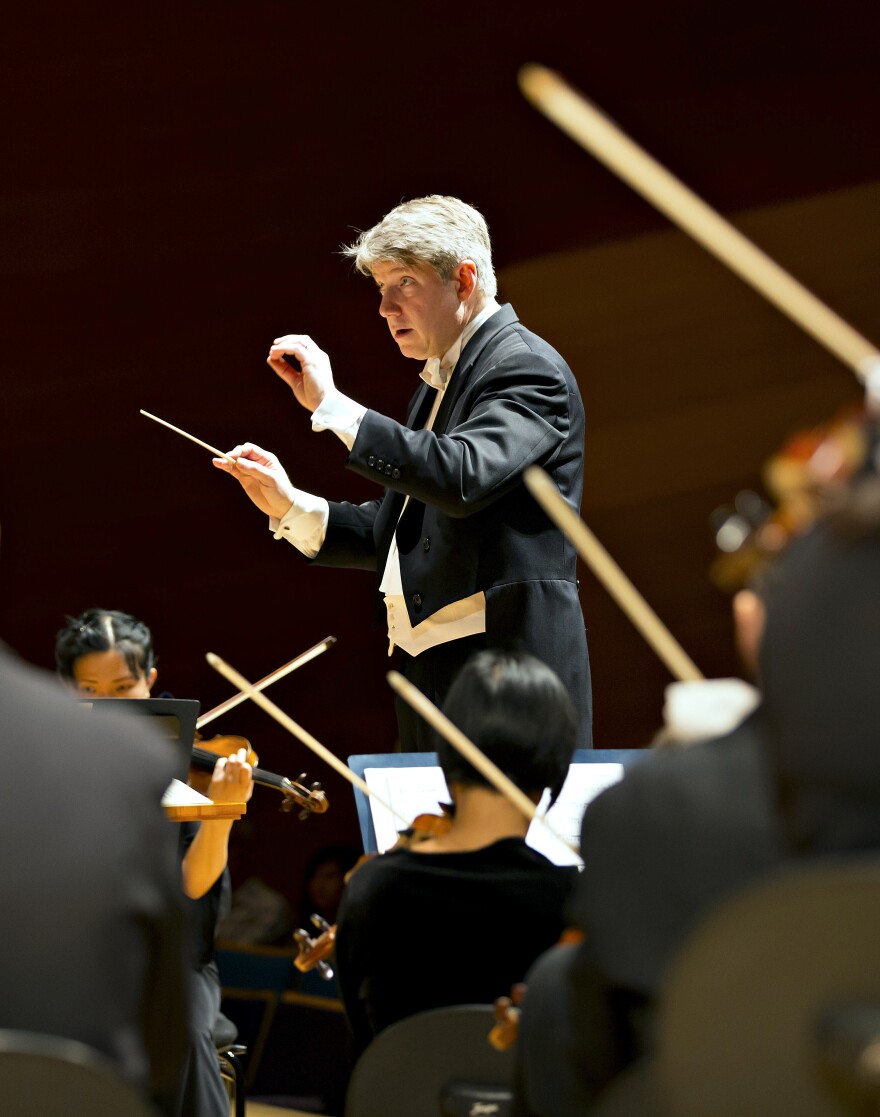Many composers have set the Roman Catholic Mass for the Dead to music. Mozart, Berlioz, Brahms and Verdi famously come to mind. Their compositions are considered masterpieces.
But Benjamin Britten’s genius was to juxtapose the austere and solemn Latin of the Requiem liturgy with the visceral and searing poetry of Wilfred Owen, who served in the British Army during World War I and died in France just days before the Armistice was signed.
In the culminating concert of its World War I-related programming, the Kansas City Symphony performs Britten's War Requiem this weekend for the first time in more than two decades. Music Director Michael Stern calls it “one of the most powerful statements of humanity produced in the 20th century.”
Stern has conducted parts of Britten’s masterwork but never the entire composition. Like others who have conducted this towering choral work, he’s taken by the piece’s raw emotional power and the message Britten was seeking to convey.
“I mean there’s not one false gesture in this music. It’s so heartfelt and so direct and so genuine and powerful because it's true," Stern says.
“Remember that Britten, at the very outset of the piece itself, doesn't say that he's condemning the players in this war,” he notes. “The pity is the war itself. And it is this unleashing of violence that we simply can't avoid doing to one another – that is what he is declaiming.”
Many musiciologists consider Britten, who was born in 1913 and died in 1976, to be one of England’s greatest composers. He wrote the War Requiem for the 1962 rededication of Coventry Cathedral, which had been destroyed in World War II.
Britten, a pacifist, had little patience for the pieties of heroic sacrifice or the glories of war. That comes through in the War Requiem – an unflinching depiction of war’s horrors, and its pointlessness.

“It's an overwhelming thing,” Stern says. “It breaks your heart, and it doesn't answer any questions particularly, right? We do have a little glimmer of hope that the world may not end but we certainly should pay heed. That's what the piece is saying.”
Download the text of Britten's War Requiem
Christine Brewer sings the soprano part in the Kansas City Symphony’s production. It’s a part she’s performed 15 or 20 times. She recalls a performance she gave in Dresden shortly after the fall of the Berlin Wall. Dresden had been firebombed by the Allies in World War II and the performance was at a cathedral that, like Coventry, had been destroyed and rebuilt.
“When we finished, not one person made a sound,” Brewer says. “The audience did not applaud. We were at a church, you know. And I will never forget it. I will never ever forget that performance.”
The piece presents formidable logistical challenges. It calls for a large symphony orchestra, a small chamber orchestra, an adult choir, a children’s choir and three soloists: a soprano, tenor and baritone.
This massive array of forces only comes together at the end of the piece, when the tenor and baritone, representing opposing enemy soldiers, speak to one another – for the first time – from beyond.
“I think there’s something about the humanness of these two young men and the words they’re saying and the sort of innocence, and how that to me speaks volumes,” Brewer says.
Stern says that in planning the Symphony’s season and its commemoration of World War I, he knew he would have to include the War Requiem.
“I think this is a necessary piece of music," he says. "You can't say that about absolutely every masterpiece even, but this is a masterpiece, and I think it is necessary, perhaps made more urgent right now."
Wilfrid Owen was just 25 when he was killed. But the war had instilled in him, and his poetry, a depth of human understanding beyond his years.
“My subject is War, and the pity of War,” he wrote. “The Poetry is in the pity. All a poet can do today is warn.”
The Kansas City Symphony's War and Remembrance with Britten, May 5-7 in Helzberg Hall at the Kauffman Center for the Performing Arts, 1601 Broadway, Kansas City, Missouri, 64108.
Dan Margolies is KCUR’s health editor. You can reach him on Twitter @DanMargolies.





